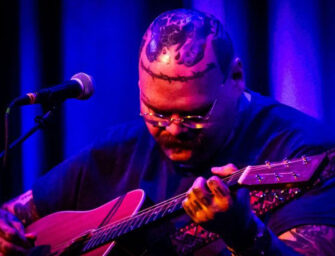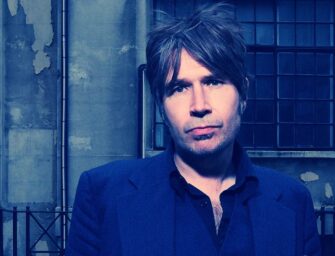
Jimbo Mathus: “If I have a title that speaks to me then the whole song kind of falls out of that”
The prolific Mississippi songwriter tells us about collaborating with his good friend Andrew Bird and writing from the title down
A songwriter as talented as he is prolific Jimbo Mathus might be best known for his work in the 1990s with swing revival band Squirrel Nut Zippers. With the group disbanding in 2000 (eventually reforming in 2016), Mathus has largely concentrated on his solo records since, including high points such 2012’s White Buffalo on which he was backed by the band The Tri-State Coalition. Throw in collaborations with Buddy Guy and Elvis Costello, as well as writing and producing for other artists, and you get a clear picture of this hardworking artist.
The reason for our recent conversation with Mathus is his latest album These 13, a joint venture with the singer-songwriter Andrew Bird. Friends for over 25 years, they first met at a fair in Wisconsin where Bird was working as a medieval fiddler, with a shared musical history in the Squirrel Nut Zippers, this is their closest creative partnership in over two decades. The gospel-tinged record has a cosy charm that reflects their close bond and the strength of their writing alliance…
Listening to These 13 felt like discovering some lost field recordings that you and Andrew had stumbled upon rather than originals that you’d written…
“Some of my favourite inspirations and influences would be the [Alan] Lomax stuff and the Harry Smith stuff. Definitely the Lomax stuff, you know, me being from Mississippi, some of his greatest discoveries were down here.”
When you and Andrew got together to start working on the album, did you have initial discussions of what it might sound like?
“I’m also a record producer and I write for a lot of other different people. I wasn’t exactly sure what he was going for so I just started throwing a lot of ideas at him. I love the cell phone and little voice memos. I used to carry around a tape recorder back in the day so if I thought ‘This is something,’ I wouldn’t forget it. That evolved into the cell phone. I don’t think we had any conversations, I just started shooting him little ideas and sketches of songs that I had. I didn’t want to send him the whole song I just wanted him to hear his take on just me and the guitar.
“Initially the concept was just really stripped down like my demos. The concept was gonna be just he and I, and that was really the only parameter and it was going to be old-timey. And so then he would, text, you know, ‘I really liked this’ or, ‘Not really what I was thinking.’ He added a lot and then, as I saw what he was going for, I started either digging back in my catalogue, writing new stuff or finding old titles that I had like laying around that I thought might work. I write from titles, 99% of my songs are written from the title down”
You mention having your cell phone handy, is that because songs will come to you at any moment?
“Songs are pretty easy if you just have a few nice combinations. I’ve probably released close to 300 songs on my own, if not more. I really got in the habit of it in my early 20s and I’m 53 now. It’s just part of my nature, you know, to think of those ideas. The cell phone is so handy, we composed the whole record in maybe one or two conversations and then when we met at the studio we already knew what keys it was going to be in. Andrew would react and he wrote a lot of nice bridges. He wrote other verses. I got towards the end where I would just send him like a couple of lines, just to see what he would come up with, even though I had the whole thing finished.
“We had such a good groove going. If he liked it, he’d grab his guitar, or go to the piano and finish the song. Dig Up The Hatchet, I’d sent him the first two lines of the chorus and the kind of the beat of the song and he finished that whole thing on his own.”
Were you often pleasantly surprised with what Andrew came back with?
“He brought out certain things that were really cool. I’m not attached to my stuff, I’m very free with it. I would just leave some of my stuff out because he’s a great songwriter, he’s a great lyricist. When you have a collaboration like that, sometimes the stuff you leave out can turn into really cool stuff like, like Dig Up The Hatchet. My initial take on it was more violent. It was more like confrontational with loved ones and you start going for the low blow and, maybe, living in the Deep South, there’s a lot of redneck people and they get into some really bad stuff because of fights, domestic violence and this kind of thing. So my take was originally more violent in that way. But he added that real conciliatory tone and forgiveness to it. And I never saw that coming.”

Jimbo Mathus (left, with Andrew Bird): “We had nothing on the line, this was just an experiment”
It sounds like there’s a balance between dark and light in your collaboration…
“My stuff tends to be really dark and rural. I’m very American Southern almost to the point of gothic, intentionally using a lot of dialect because we have so many cool expressions down here. Those things really leap out at me a lot. Interestingly enough, he’ll hear me say a word or sing about something and has no idea what I’m talking about, because he doesn’t know that expression. So he thinks it means something completely different than it does and then he would react to that.
“Hi John is one thing that comes to mind. In the Deep South and the Gulf Coast, there’s a lot of voodoo magic that goes on. It’s spells and potions and different things like that. Hi John is actually a root that grows in the ground. Andrew thought it was about an actual person and even though he didn’t sing that one, the whole time he had no idea what I was singing about.”
Would you ever be writing with Andrew’s voice in mind, or does that not come into it at that early stage?
“I do write with words of other vocalists in mind but I didn’t really have to with him. There was one song that I never could really sing that I wrote, Beat Still My Heart. I tried it a couple of different times in the studio but it just suited his voice perfectly. He’s got a bigger range than me and I thought of that one as a type of ballad and he was able to sing it beautifully. Then he would take stuff like Burn The Honky Tonk, which I had recorded on another record, and he made it more of a Marty Robbins kind of thing.
“I’ll just share this, it’s a secret of mine and I don’t know if it’ll matter to anyone else, but I write from titles. If I have a title that speaks to me then the whole song kind of falls out of that. I’m not just fishing around; I’ve got the plot encapsulated in the title. I work backwards from the title and it will also lend itself to what genre of song it’s going to be. Is it funk, is it country, is it honky-tonk is it hardcore blues?
“With text messages, it’s so cool because people are condensing their thoughts into very short phrases. So you could be talking about a bigger topic but you know, you’ve only got a few words to express it. A lot of my friends, being visual artists and musicians, already have a musicality in their speech, so you get these great little series of lines in text. My way of songwriting is that you cram as much into short sentences as possible.”
Were there times in the studio when those text conversations and partially formed songs didn’t quite work out as you’d hoped they would?
“Very little had to be changed. We recorded more than we needed to and ended up really getting a nice balance in sequence with the one little musical interlude. You know, as the record comes together it’ll get a centre of gravity and it’ll form and you can start leaving stuff out. Andrew is a great record producer as well. So we have both of us songwriters, both of us artists, both of us producers and still never one moment of doubt or conflict of any kind. That speaks to our camaraderie, brotherhood and simpatico way of thinking that we started all those 25 years ago and so it’s lucky to have somebody like that.
What would you say are Andrew’s strengths as a songwriter?
“Well, my God, his lyrics are fascinating, unique, you know… They’ve simplified over the years and become more streamlined. He has perfect pitch and can sing any melody and he’s very studious about it and he’s gifted at it. He taught himself guitar so he can compose on a different instrument. The guitar is very easy to bash out a chord, which is not that easy with a violin. He’s one of the best out there I think it’s his success has proven that and people love his songs.”
Is the process of writing with someone, rather than for someone, a different experience? Which do you prefer and do both have their merits?
“If anybody is a good songwriter, you would want their input. Some artists aren’t, but some singers I work with are great lyricists and maybe they have some ideas so it’s always about collaboration. I’ll take it as far as it can go with anybody I’m working with. They can go at least to where I’m at and then maybe we can take each other up a little more.”

Jimbo Mathus (left, with Andrew Bird): “My way of songwriting is that you cram as much into short sentences as possible.”
Have there been times where that hasn’t happened, when things haven’t clicked or you haven’t got as much out of a writing partnership as you would hope for?
“I’ve never had a writing partnership, it’s always just been my songs, maybe just opening them up to some other people but I’ve never written songs with other people. This was a brand new thing for me. Same for him, you know, he had already handled his songs perfectly fine without me. That was the biggest shock of These 13, the writing collaboration. I wasn’t shocked that we were able to vibe so good and just fall back into our great camaraderie and our psychic connection. I knew he would play perfectly and he also can play rough and play the blues. He can play very sophisticated and he can play very rough, depending on what he needs to do.”
Does that brotherhood make the collaboration easier as it means you can be completely honest with each other?
“I would think so. We had nothing on the line, this was just an experiment. There was no label asking us to do this, we just pooled our resources and did the sessions on our own. So there was nobody telling us anything and no pressure. Of course, there would be no ego anyway with us. The music ended up speaking for itself, as it should, and it got some attention.
“I’m sure opportunities will present themselves and I’m sure we’ll jump on it if it’s something we can do because we enjoy one another’s company, we’re a good balance of personalities and our music sounds great together. I foresee this being a partnership and a way we can entertain and play concerts for years to come.”
You mentioned earlier that you’ve written over 300 songs throughout your career but have you had times where it’s been a struggle?
“I have not. I have so many little tricks that I’ve developed that work for me. Literature is a big thing, reading novels and history. I get a lot of ideas from history, little moments that are very evocative of places or it’s about a real event, right here in my neighbourhood. Sometimes I’ll want to write a song and I’ll think I need to find a cool ghost story around the neighbourhood here. I’ve heard of so many and it’s, ‘I can’t remember any right now so let me think about this for a minute, or go find this book on my bookshelf.’ Every once in a while there’s a little project song I’ll think of that is cool or something like, ’I’m gonna write a song about a car.’”
Do you think anyone wanting to write a song could use those same tricks?
“I think very much so, potentially. It’s habit and training, so it’s more as a way of thinking now, as much as trying to do anything, it’s just I think in songs. My ears are always caught for an expression or dialect. There’s a lot of history here with the Chickasaw and Choctaw and with the African American and the pioneer history here in Mississippi. There are just so many little stories in there.”
With such a vast catalogue, are there things you do in order to keep your songs sounding fresh and not too repetitive?
“Well I pigeonhole them in so many different genres, I’ll write everything from Anglo Saxon or African American folk music, early folk music, swing it up to electric blues and honky-tonk, soul and gospel, rock and roll, heavy rock… I’ll just pigeonhole them in different categories and then I’ll save them for when either I need it or when somebody I’m working with needs it.
“That’s why it’s easy for me, because I write in so many styles. And you actually use all those different styles so it’s not an exercise. It’s just like, ‘This is obviously for a really raw blues album, next time I make one or next time another dude makes one I got this song for him,’ so I’m not trying to fit it all into my thing.”
Taking that all on board, what is the most satisfying thing for you as a songwriter?
“Every step of the process from the initial inspiration, but I’ll say there are two great moments. The initial inspiration when I’m driving down the back roads, I’ve got my cell phone on me, I get the strike and I put on the voice memo and sing the whole song. And then to actually having it realised in the studio by either me or even another artist, it means even more to me, you know, to have it mixed, finished, mastered. So the first part and the last part, are the two favourite parts of the deal. But every step of the way I enjoy.”
Interview: Duncan Haskell

































Related Articles